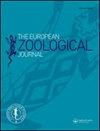基于温度因子的土耳其小蜂房甲虫对蜂群的影响
IF 1.6
4区 生物学
Q2 ZOOLOGY
引用次数: 0
摘要
摘要在气候变化的背景下,生物入侵正成为最严重的全球环境威胁。随着气候的变化,养蜂业面临着这样的入侵。其中一种入侵者是小型蜂箱甲虫(SHB),它在一些国家尚未遇到,目前处于可预防的水平。SHB对蜜蜂群落是一种极具破坏性的害虫,因为它会破坏蜜蜂的梳子和幼虫,以及蜂蜜和花粉。尽管SHB威胁着蜜蜂种群,但气候变化对虫害严重程度及其增长率的影响仍然未知。这一养蜂问题在理论上是通过使用蜜蜂-SHB耦合数学模型来解决的,在该模型中,SHB的生长速度随着时间的变化而变化,以应对气候的变化。当温度升高时,由于SHB生长速度的增加,蜜蜂群落会崩溃,虫害的严重程度也对蜂群的生存起到了一定作用。这项研究表明,未来,全球变暖将增加SHB造成的群体损失,并可能增加SHB传播到目前没有SHB的地区的风险,应采取预防措施防止传播。本文章由计算机程序翻译,如有差异,请以英文原文为准。
Future effects of small hive beetle, Aethina tumida, on honey bee colony in Turkey based on temperature factor using a mathematical model
Abstract Biological invasions are becoming the most serious global environmental threats under changing climate. Beekeeping has faced such invasions with the changing climatic. One of these invaders is the small hive beetle (SHB), which has not yet been encountered in some countries and is currently at a preventable level. SHB can be a highly destructive pest for honey bee colonies, as it damages honey bee comb and larvae, as well as honey and pollen. Although SHB threatens honey bee populations, the impact of climate change on the severity of infestation and its growth rate are still unknown. This apicultural issue is theoretically addressed by using a coupled honey bee–SHB mathematical model in which the rate of SHB growth varies with time to account for changing climate. When the temperature rises, honey bee colonies collapse due to an increase in SHB growth rate, and the severity of the infestation also plays a role in the colony’s survival. This study suggests that in the future, global warming will increase colony losses from SHB and may increase the risk of SHBs spreading to regions where it is currently absent, and precautions should be taken to prevent transmission.
求助全文
通过发布文献求助,成功后即可免费获取论文全文。
去求助
来源期刊

European Zoological Journal
Agricultural and Biological Sciences-Animal Science and Zoology
CiteScore
3.10
自引率
5.60%
发文量
80
审稿时长
30 weeks
期刊介绍:
The European Zoological Journal (previously Italian Journal of Zoology) is an open access journal devoted to the study of all aspects of basic, comparative and applied protozoan and animal biology at molecular, cellular, tissue, organ, organismal, population, and community-ecosystem level. Papers covering multiple levels of organization and integrative approaches to study animal form, function, development, ecology, evolution and systematics are welcome. First established in 1930 under the name of Il Bollettino di Zoologia, the journal now has an international focus, reflected through its global editorial board, and wide author and readership.
 求助内容:
求助内容: 应助结果提醒方式:
应助结果提醒方式:


